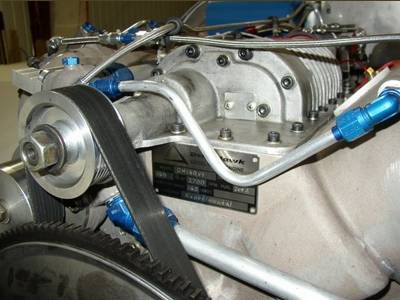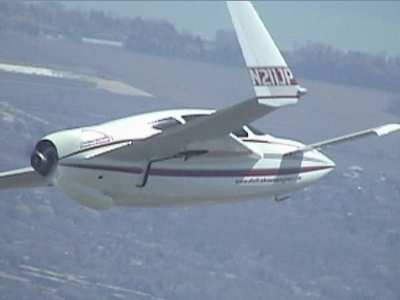Says Concerns Cited Are Already Addressed By FAA Regs
The crew at DeltaHawk Engines, Inc. knows a thing or two about
developing piston powered diesel-fueled engines for aviation
applications... and joined Diamond Aircraft this week in responding
to ExxonMobil Aviation's position that jet fuel should not be used
in those powerplants.

As ANN reported, ExxonMobil shocked the
aviation world last month in a missive to its fuel distributors,
stating the company did not approve fueling diesel-powered aircraft
with Jet-A. For the moment, those distributors are still allowed to
sell Jet-A to pilots flying diesel-engine aircraft... but customers
must sign an indemnity agreement before doing so, waiving
ExxonMobil of liability should something go wrong.
Diamond Aircraft -- the largest provider of diesel-powered
planes, most notably the Thielert-powered DA42 Twin Star --
responded shortly after to ExxonMobil's statements... saying it was
as "surprised" as owners were to hear the news.
While conceding the technical reasons cited by ExxonMobil were
"valid general concerns for operation of diesel engine powered
aircraft," Diamond added "in the case of TAE and Diamond, all
listed reasons, specifically ignition quality, freezing point and
lubricity, have been addressed as part of the engine and aircraft
certification process and approved by the responsible airworthiness
authorities."
 Those sentiments were echoed by DeltaHawk, which is working to
certify its V-4 aerodiesel engine for aviation applications.
"ExxonMobil is correct in stating that the FAA is working on this
matter. Indeed, all three technical issues raised by ExxonMobil are
already specifically included as analysis and test items during the
diesel engine FAA Type Certification process," DeltaHawk said
Wednesday.
Those sentiments were echoed by DeltaHawk, which is working to
certify its V-4 aerodiesel engine for aviation applications.
"ExxonMobil is correct in stating that the FAA is working on this
matter. Indeed, all three technical issues raised by ExxonMobil are
already specifically included as analysis and test items during the
diesel engine FAA Type Certification process," DeltaHawk said
Wednesday.
"All three are readily-addressed issues for any diesel engine
appropriately engineered for aviation use and being certified and
distributed under current aviation safety standards. They will also
be a part of the high altitude Technical Readiness Level (TRL)
testing to be done with the DeltaHawk engine by the US Navy."
DeltaHawk addressed each of ExxonMobil's cited concerns as
follows:
- Freezing Point. "Many jet fueled aircraft
which do not fly at "speeds that cause heating of the fuel in the
wing due to friction caused by airflow" have been operating safely
for years. The Beech King Air aircraft is one example, along with
the many turboprop conversions of piston aircraft. Even those
aircraft which do fly at high Mach speeds may also have active fuel
heating systems. The use of a fuel additive such as PRIST Hi-Flash
is also common. So, DeltaHawk-powered diesel aircraft will address
this issue in the same way used by all aircraft today: published
operating limitations plus fuel heating systems in specific
aircraft installations to extend operating limits. The DeltaHawk
diesel engine is ideally suited for use in such installations by
virtue of our built-in heated fuel recirculation and engine liquid
cooling systems."
- Lubricity. "Fuel lubricity is an issue
only if you use the fuel as a lubricant for your fuel pumps. The
DeltaHawk diesel engine fuel pump and injectors do not. All testing
to date has been done with jet fuel, and the Type Certification
test plan will document the engine's ability to operate
satisfactorily with worst case fuel lubricity. As evidence that
lubricity is not an issue, Jet A has been used in airport ground
support equipment diesel engines for many years with no problems.
DeltaHawk plans to certify use of multiple fuels, and we anticipate
that #1 road diesel will actually produce the worst case lubricity
case due to its tighter sulfur specs."
- Ignition Quality. "The lack of a cetane
specification in jet fuel is the one truly unique technical issue
for jet fuel powered aircraft diesels. Difficult cold weather
starting is the primary effect of extraordinarily low cetane on
diesel engines, but once running, the engine will perform within
normal engine limits. This is not a safety of flight issue.
Further, DeltaHawk engines were specifically designed to handle low
cetane levels, and the DeltaHawk FAA Type Certification program
will test and document engine performance with worst case cetane
fuel."
DeltaHawk CEO Diane Doers echoed sentiments of Diamond CEO Peter
Mauer, in questioning what appears to be a snap overreaction on the
part of ExxonMobil.
"We wonder what 'extensive technical review' could have been
conducted by ExxonMobil without extensive technical discussions
with either Diamond or DeltaHawk," Doers said. "It seems that broad
generalizations have been relied upon, when specific dialogues
could have provided reassurance that the issues were being
appropriately addressed.

"Diesel engines for aircraft bring significant benefits by
reducing both usage of leaded fuel and total fuel consumption," she
added. "They also will improve safety, especially in areas of the
world where on spec 100LL is not available. In a time when bottom
line costs and becoming 'green' are ever more important,
DeltaHawk's innovative engines are in demand worldwide for both
general aviation and military applications. Diesel power will be an
important contributor to a vibrant, cost-effective aviation
industry. We look forward to working with ExxonMobil for the good
of our mutual customers."
 ANN's Daily Aero-Linx (04.16.24)
ANN's Daily Aero-Linx (04.16.24) Aero-News: Quote of the Day (04.16.24)
Aero-News: Quote of the Day (04.16.24) Airborne 04.10.24: SnF24!, A50 Heritage Reveal, HeliCycle!, Montaer MC-01
Airborne 04.10.24: SnF24!, A50 Heritage Reveal, HeliCycle!, Montaer MC-01 Airborne 04.12.24: SnF24!, G100UL Is Here, Holy Micro, Plane Tags
Airborne 04.12.24: SnF24!, G100UL Is Here, Holy Micro, Plane Tags Airborne-Flight Training 04.17.24: Feds Need Controllers, Spirit Delay, Redbird
Airborne-Flight Training 04.17.24: Feds Need Controllers, Spirit Delay, Redbird





